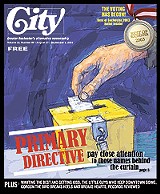[
{
"name": "500x250 Ad",
"insertPoint": "5",
"component": "15667920",
"parentWrapperClass": "",
"requiredCountToDisplay": "1"
}
]
The old quiz show What's My Line might speak to this year's race for two City Court judgeships.
In the run-up to the September 9 primary, the official candidates list has eight lines; after the primary (which is only for registered Democrats to choose their party's two candidates) there will be seven lines for the multiple political parties.
There are, however, just three names spread among the multiplicity of lines: John Schwartz and Marjorie Byrnes, both running for re-election; and Jack Elliott, who's trying to break into the pack.
As sitting judges, Byrnes and Schwartz have their share of name recognition. But as far as the ballot is concerned, Byrnes is the champion for name repetition. She's got the Republican, Independence, and Conservative party lines sewed up. She's also entered in the September 9 primary for the Democratic Party's nod. So if she wins the primary, she'll end up with four separate lines on the final ballot.
By contrast, if the Democratic voters choose Schwartz and Elliott, each of the latter will have two lines at most, Democratic and Working Families.
But there's another level of arithmetic here. When it comes to the number of registered voters, the Democrats have a strong advantage over all other parties in the city. So in the race for City Court Judge, the candidates who get the two Democratic lines probably have it made.
This explains the struggle to grab these two lines --- and as many others as possible to sweeten the package, even if it means an oil-and-water mixture like Democrat-and-Conservative.
It also indicates why Byrnes --- today a registered Republican --- forced the primary by collecting signatures from registered Dems in the city. (Schwartz and Elliott, both registered Democrats, had received the party's nod to run.)
What are the candidates' backgrounds? Here's what their resumes and statements show:
• Incumbent Schwartz has been a City Court judge since 1983, an acting County Court and Family Court judge since 2001 and 2002 respectively, and the 7th Judicial District Supervising Judge since 2002. He's been named presiding judge of the local Integrated Domestic Violence Court, as well. In 1995, he founded the local Drug Court, an alternative program that allows offenders to choose treatment and avoid time behind bars. Before coming to the bench, Schwartz was a partner at a downtown law firm, and he's been on the School of the Holy Childhood board since 1975. "I'm a very active problem solver," he says. "I'm the first one who aggressively attacked the drug problem in this community --- same thing with domestic violence."
• Newcomer Elliott has been an assistant Monroe County public defender since 1990. He began his career with a Penfield law firm, and he's now active with city organizations like the East Main Neighbors Association and the Community Health Network. "I think I'll bring diversity to the bench," he says, explaining that he'd be the only City Court judge with a background as public defender. "You have to know when to be tough and when to give a break," he says. People who get their day in court "need to know there's someone up on the bench who cares about them," he says, pointing to his own community involvement.
• Incumbent and challenger Byrnes was an assistant Monroe County district attorney for seven years before becoming a City Court judge in 1993. She was in private practice 1986-1987. A member of the Charlotte Community Association, the National Rifle Association, and skeet-shooting groups, Byrnes is staking her race on experience and community involvement. She says she stands apart by having been an assistant district attorney before coming to the bench. Her campaign literature boasts that she "successfully prosecuted numerous homicide cases and other violent offenses." She also touts her job-related service with the County Mental Health Committee, which, as she says, is "specifically designed to improve the criminal justice system for the mentally ill."
City Court judges may be low on the totem pole within the New York State Unified Court System; they deal with lower-level offenses and, generally, unspectacular stories. But they also make decisions that impact not just offenders and victims but the fabric of urban life.
Moreover, with 10-year terms and salaries over $100,000, these judgeships are also pretty decent jobs for the career-minded. So the competition can be heated, within the limits dictated by "judicial temperament."
Certainly Byrnes's strategy has some party regulars pretty steamed.
"This is a desperate attempt, a duplicitous attempt by Marge Byrnes to stay in office," charges Molly Clifford, chair of the Monroe County Democratic Committee. Clifford says the problem starts with "a loophole of state election law that allows judges to take [party] lines without being able to talk about the issues."
What do the candidatesthemselves say about this and other things?
The primary "affords the Democratic voters an opportunity," says Byrnes. "In 1993, I also reached out to Democratic voters, not to the Democratic Party." (She explains she was a registered Conservative in 1991-92 but soon switched to Republican.) "I don't really think it [party registration] is relevant in a judicial race."
But procedure isn't everything; this race also rests on some philosophical differences.
Of course, ethics rules prevent judicial candidates from discussing cases or issues that might come before them in court --- which raises questions about the practice of accepting party endorsements. Political parties, after all, have platforms that designated candidates are in theory pledged to advance; conversely, parties can be expected to endorse only those candidates who agree with them.
Yet despite all this, one big issue has emerged in the City Court Judge race: the Drug Court and its uses.
Less than a decade old, the Drug Court is a diversion program for county residents charged with --- in the words of a Monroe County DA backgrounder --- "a non-dealing, non-violent, drug-related offense." Here's how it works: After entering a guilty plea, the offender gets supervised treatment instead of a jail or prison term. If he or she graduates from the two-year program, the original charges will be dismissed. But if the offender doesn't stay sober or otherwise comply with the rules, he or she will be looking at time behind bars.
Marjorie Byrnes has some basic legal objections to the Drug Court. In certain respects, she says, "an individual is giving up their constitutional rights" by taking this track. She cites as examples the right "to challenge an accusatory instrument" and even the right to trial. Going into the program, she maintains, could make it impossible for someone to get a wrongful conviction overturned. Moreover, she says, someone in the program could lose a job because he or she was required to enter full-time treatment.
Schwartz founded the court, and he sounds proud of its history. Rochester, he says, was first in New York State to have such a court, and first in the Northeast. There now are 90 drug courts in the state, he says. He dismisses Byrnes's objections. First, he says, if you plead guilty in any court under any circumstances, you automatically waive your right to a full trial. Second, "no one forces you into [the Drug Court]," he says. You can opt out and go to trial, he says, with all the relevant constitutional guarantees.
Based on his experience as a PD, Jack Elliott sides with Schwartz. "I'm a firm believer in the Drug Court," he says. "Everyone should attend and watch. There's nothing better than seeing someone change... I think that separates me from my opponent: She's sent very few people to Drug Court over the years."
On this last point, there are, well, different interpretations.
"I'm probably in the middle of the pack [among local judges] in transferring people over to Drug Court," says Byrnes. "She doesn't refer any cases" or at least has not made referrals "in recent times," says Schwartz.
Lorraine Beeman, clerk of the Drug Court, sifted through her records to see how the City Court judges stack up on this. She says Schwartz has made the highest number of referrals, followed by judges Stephen Lindley, Ann Pfeiffer, and Thomas R. Morse, then Teresa Johnson and Melchor Castro. Beeman adds that Judge Roy King, now the Drug Court's presiding judge; and Judge Ellen Yacknin, a newcomer to City Court, both support the program. Byrnes, says Beeman, has made the lowest number of referrals of all the judges.
Note: Monroe County Republican Chairman Stephen Minarik did not return our call for comment on this and other primaries.
Primary facts
Primary elections will be held for several elected offices in Monroe County on September 9. To vote in the primary, you must be a city resident and a registered member of the political party holding the election. Polling hours will be noon to 9 p.m. Information: Monroe County Board of Elections, 428-4550 (TDD: 428-2390).
For more about the 2003 Primary elections, visit the News Articles section by clicking here!Speaking of Primary, City Court
-

A landlord’s victim fights back and blazes a trail for tenants
Jan 22, 2020 -
News briefs 9.17.03
Sep 17, 2003 -

Primarily personalities?
Aug 27, 2003 - More »
Latest in Featured story
More by Jack Bradigan Spula
-

The state of Main
Apr 14, 2004 -
School improvement: the price is wrought
Apr 7, 2004 -
Hour of power
Mar 31, 2004 - More »






